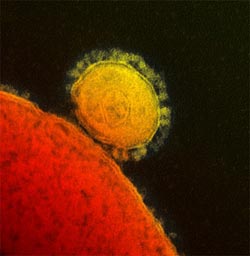Infectious Disease Research Gets a Boost from Websites, Blogs, and Social Media

Marcel Salathé will publish an article describing a new field of research known as digital epidemiology. This field is of increasing importance for tracking outbreaks of infectious diseases such as the one caused by a novel coronavirus, pictured here.<br> <br>Credit: Rocky Mountain Laboratories, National Institute of Allergy and Infectious Diseases, National Institutes of Health<br>
Salathé will publish an article in the 1 July 2013 issue of th New England Journal of Medicine, with colleagues from the Harvard Medical School, describing the advantages and challenges of “digital epidemiology” — a new field of increasing importance for tracking infectious disease outbreaks and epidemics by leveraging the widespread use of the Internet and mobile phones.
“In the past year, the world has seen an emerging outbreak of two viruses with considerable pandemic potential: Middle East Respiratory Syndrome Coronavirus and Avian Influenza A H7N9,” Salathé said. He explained that the former is similar to the virus responsible for the SARS outbreak in 2002 and 2003 and has, since 2012, infected 64 people, 38 of them fatally. Influenza A H7N9 is a virus that normally circulates in birds but has, since the beginning of 2013, infected 137 people, 32 of them fatally.
“Digital epidemiology played a crucial role in the surveillance of both Middle East Respiratory Syndrome Coronavirus and Avian Influenza A H7N9 by enhancing transparency and helping public health officials to understand outbreaks more fully. It is clear that the importance of digital epidemiology will only increase in the future as more people get mobile access to broadband around the globe,” said Salathé, who uses data from social media in his research to study how sentiments about vaccination spread in populations. “With 6.8 billion mobile-phones and 2.9 billion people online, it's getting increasingly hard for any micro-organism to spread undetected for long.”
Salathé also said he predicts that digital epidemiology will not be limited to just infectious diseases for long. “Mining these novel, big-data streams is of enormous interest to practically anyone interested in health and disease,” he said. “For example, researchers and public health officials could use data-mining techniques to detect adverse drug reactions, assess mental disorders, or track health behaviors much faster than they do with traditional methods.”
Salathé added that he is honored to have the opportunity to reach such a wide audience through the New England Journal of Medicine. “We're hoping to put Digital Epidemiology on the agenda of every public health agency to complement their traditional efforts to track diseases and assess and mitigate the spread of infectious diseases,” he said.
Media Contact
More Information:
http://www.psu.eduAll latest news from the category: Communications Media
Engineering and research-driven innovations in the field of communications are addressed here, in addition to business developments in the field of media-wide communications.
innovations-report offers informative reports and articles related to interactive media, media management, digital television, E-business, online advertising and information and communications technologies.
Newest articles

You are What You Eat—Stanford Study Links Fiber to Anti-Cancer Gene Modulation
The Fiber Gap: A Growing Concern in American Diets Fiber is well known to be an important part of a healthy diet, yet less than 10% of Americans eat the minimum recommended…

Trust Your Gut—RNA-Protein Discovery for Better Immunity
HIRI researchers uncover control mechanisms of polysaccharide utilization in Bacteroides thetaiotaomicron. Researchers at the Helmholtz Institute for RNA-based Infection Research (HIRI) and the Julius-Maximilians-Universität (JMU) in Würzburg have identified a…

ASXL1 Mutation: The Hidden Trigger Behind Blood Cancers and Inflammation
Scientists show how a mutated gene harms red and white blood cells. LA JOLLA, CA—Scientists at La Jolla Institute for Immunology (LJI) have discovered how a mutated gene kicks off…



